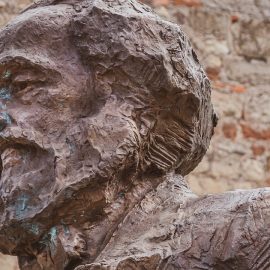

This article is an excerpt from the Shortform summary of "David and Goliath" by Malcolm Gladwell. Shortform has the world's best summaries of books you should be reading.
Like this article? Sign up for a free trial here .
What is the principle of legitimacy? And why should you pay special attention to it if you’re a police officer, government worker, manager, or employer?
The principle of legitimacy states that a government’s ability to govern is based on its perceived legitimacy. If the public perceives the government as illegitimate, it will rebel.
Learn why the principle of legitimacy is so important and how it can dramatically lower crime rates.
The Principle of Legitimacy Gives You Power
There are two aspects of a powerful entity’s power that actually make it less powerful: the limits of authority and the negative effects of the overuse of power.
What Goliaths, people with overt power, tend to misunderstand about power is that it has limitations. The traditional hallmarks of power—massive weapons, years of experience, society’s blessing—can only take you so far. The degree to which you are powerful depends, in part, on how much power your “subjects” are willing to give you. You need to be seen as legitimate. This is the principle of legitimacy.
The Principle of Legitimacy
An authority figure’s power over the rest of us is especially limited if we don’t perceive him and his power as being “legitimate.” An authority’s legitimacy is based on three things:
- We, the subjects, need to have a voice. And we need to believe that those in power care about what we have to say.
- We need to feel that the law we’re being asked to abide by is predictable.
- We need to feel that the law and the people enforcing it are fair.
If you’re the one with the power, why does it matter what people think of you?
According to the principle of legitimacy, people become defiant, rather than submissive, when they don’t view the authority as legitimate. Authorities may make the rules, but they have trouble enforcing them without legitimacy. In fact, if you aren’t “legitimate” and you exert your power, you may get the opposite of your intended effect.
An Example of the Principle of Legitimacy: Crime Rates in Brownsville
Here’s an example of the principle of legitimacy used to great effect.
Brownsville, in Brooklyn, is historically one of the most crime-ridden neighborhoods in New York City.
In 2003, Joanne Jaffe became the head of the city’s Housing Bureau and sought to use her power legitimately. Accordingly, she departed from the conventional approach to lowering the crime rate in Brownsville.
Jaffe and her team created a program offering job, education, and medical assistance to Brownsville juveniles with a record, but warned them that if they continued to commit crimes, the team would make sure they stayed in jail, no matter how minor the crime. Jaffe also committed to getting to know the juveniles’ families.
She wasn’t getting anywhere with this approach until a group of her officers bought a particularly antagonistic juvenile and his family a Thanksgiving turkey. Jaffe was touched, and asked the police commissioner for money to buy turkeys for all the families with juveniles in the program.
When the families felt cared for and heard, they willingly opened their doors to the police. This is the power of the principle of legitimacy. After this success, Jaffe and her task force started playing basketball with their charges, taking them to dinner, and driving them to doctor appointments. They got involved in their charges’ lives in ways that had nothing to do with the law.
Jaffe got astounding results: Brownsville robberies decreased every year from 2006 to 2011, and robbery arrests of program members decreased from roughly 370 arrests (one year prior to starting the program) to roughly 20 arrests three years later. These were the results of Jaffe’s team following the three features of the principle of legitimacy.
What Made Jaffe’s Approach legitimate? Why Did It Work?
- The Brownsville families felt heard. When Jaffe visited families, she told them she understood why they sometimes hate the police. She said that although it seemed like the police were harassing them, it was because they truly care about them. By getting to know the families, Jaffe opened up honest, direct, and friendly communication between juvenile delinquents and the police.
- Jaffe made the law seem more predictable and fair. Likely all of the juvenile delinquents in Jaffe’s program had a family member who had been in jail. Because so many people they knew were imprisoned, the law didn’t seem fair to these kids and their families. It felt like the police were out to get them. Jaffe made it clear that her goal was to keep program members out of jail. By offering help to families wherever and whenever it was needed, subsequent arrests (if they happened at all) seemed fairer.
Use this example to think about ways you can apply the principle of legitimacy in your own life. Remember, you only have as much power as those subservient to you give you.
———End of Preview———

Like what you just read? Read the rest of the world's best summary of "David and Goliath" at Shortform . Learn the book's critical concepts in 20 minutes or less .
Here's what you'll find in our full David and Goliath summary :
- Why being the underdog can actually be an advantage
- Why you shouldn't be afraid of powerful giants
- Strategies to get an edge when you're overpowered






